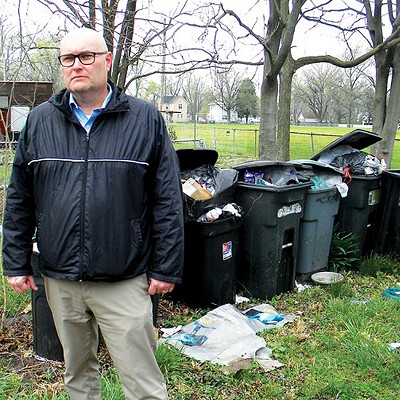Deputy governor Christian Mitchell is Gov. J.B. Pritzker’s go-to guy on marijuana legalization.
Mitchell last spring spoke at legislative committees and community forums, pushing plans to legalize marijuana for recreational use. As recently as last month, he was telling reporters that any veto-session changes to the legalization bill that passed last spring will be minor.
“What we have said to everyone is that the trailer bill for veto is going to be highly technical stuff that needs to change in order to ensure a smooth roll (out) into Jan. 1,” Mitchell told Capitol News Illinois. “It’s not a forum to re-litigate issues on which folks lost out (in) negotiations.”
Mitchell was less talkative when I caught up to him after a Monday press conference outside Illinois Department of Transportation headquarters in Springfield, where the governor and a host of legislators broke their own arms with back pats while announcing a $23.5 billion transportation spending package.
I mentioned a story that had run in that morning’s New York Times and asked a simple (I thought) question: Is the governor’s office considering changing the legalization law to remove sales of vaping concentrates and oils from the list of cannabis products that will become legal on Jan. 1?
Call the Department of Health, Mitchell advised. But you’re with the governor’s office, I noted, and you’ve been in charge of marijuana legislation for Pritzker. “I’m not in charge of vaping for the governor’s office,” Mitchell told me.
Oh.
Emily Bittner, Pritzker spokeswoman, intervened and told me to email questions to her, even though I only had one yes-or-no question that the guy two feet away should have been able to answer: Is the governor considering amending the law to prohibit sales of cannabis vaping products once pot becomes legal in less than three months? I sent Bittner an email asking exactly that. Haven’t heard back. Also called the state Department of Health. A spokeswoman emailed back, saying she’d check.
The New York Times piece that prompted my question concerned itself with the safety of vaping products containing THC, the active ingredient in marijuana. At least 33 people nationwide have died from vaping. The first reported death came two months ago in Illinois, where a total of three people have died. Nearly 1,500 people across the nation have fallen sick. Experts are blaming THC vaping products. The Center For Disease Control has warned folks not to vape THC, regardless of whether products are purchased legally or on the black market.
According to the Times story, vaping products account for 30% of the legal marijuana market, even though the folks who sell it acknowledge they don’t know much about what they’re selling. “There’s a glaring gap in trying to understand this product,” Jerred Kiloh, president of the board of the United Cannabis Business Association, which represents California pot stores, told the Times. “We don’t know what the chemical composition is, and we especially don’t know what the composition is once it’s been combined, heated and inhaled.” Neal Benowitz, a University of California scientist who has long warned that vaping THC could be hazardous, told the paper that he’d like to do research, but federal law, which decrees pot to be a dangerous drug without a purpose, prohibits it. “I’m not able to take products we think are hazardous and do analysis,” Benowitz told the Times. “I can buy a vape device around the corner, but I can’t bring it into the lab and test it.”
Less than three weeks ago, Sen. Toi Hutchinson, D-Olympia Fields, acknowledged a health crisis but told the Chicago Sun-Times that prohibiting sales of THC vaping products isn’t the answer. Since Hutchinson, who is set oversee the state’s marijuana industry – a cannabis czar thingy created by the legalization law – told the Sun-Times that the state is good to go, the number of deaths and illnesses has climbed both in Illinois and across the nation. Researchers have hunches but no proof of the culprit. Previous guesses have been wrong, with the Mayo Clinic debunking theories that Vitamin E or other substances used to thicken THC oils are to blame.
Some things are clear. A bunch of folks have gotten sick and died after vaping THC, no one can say with certainty why that is, and Pritzker is pushing ahead with plans to sell a potentially deadly product that the federal government has warned folks to avoid. Pot, which has long enjoyed a reputation for never killing anyone, should have been legalized a long time ago, but not like this.
Perhaps coincidentally, vaping products will be taxed at 25%, the highest rate under the legalization law, which levies a 10% tax on regular old weed, the kind you smoke. On the other hand, the Pritzker administration has insisted that revenue from a marijuana market worth as much as $1.5 billion a year has nothing to do with policy.
I would hate to think that the state is ignoring health concerns for fiscal reasons. But it is hard to figure why Pritzker is going full-bongs-ahead on THC vaping, particularly since he’s come out in favor of banning flavored e-cigarettes. Until we know more, vaping THC seems as bad an idea as the state allowing sales and collecting taxes.
SJ-R BLUES: You know it’s bad when a politician complains about poor service from the local daily, and Rep. Tim Butler, R-I Want My Paper, isn’t alone in bitching about missed deliveries since the State Journal-Register revamped its circulation operation last week. Butler has tweeted his frustration: His paper hasn’t been delivered for several days and calls to customer service haven’t helped. Nextdoor.com is blowing up with complaints from other unhappy subscribers. Then there are folks like Virginia Taylor and her husband Robert, who found out last week that their services are no longer needed after delivering the SJ-R for nearly 25 years.
Carriers had been told changes were coming, but Taylor says she didn’t realize that she and her husband no longer had a route until the last minute. “They just threw us out,” Taylor says. Both she and her husband are in their mid-70s, and the routine is as important as the money. “It gets us out of bed in the morning,” she says. “It gives us purpose and keeps us healthy, with the walking that we do.” Twice, Taylor says, her husband has suffered heart attacks, once while walking the route. “We weren’t late those days,” Taylor says. “We have never missed a day. We have never been called because we didn’t show up.”
Other carriers, also, have lost routes, including Susan Grant, who, like the Taylors, had delivered the SJ-R for more than two decades. “They let me go, they didn’t give me no reason why,” Grant says. She recalls calling the SJ-R many times after learning that changes were afoot, but only found out that she had no route until the day it happened last week. “I had to keep calling and calling,” says Grant, who celebrated her 70th birthday last week. Grant says she’s been getting plenty of calls from upset customers. “My customers, they’re not getting their papers like they should,” Grant says. “They always call me. I told them, ‘You don’t call up there (to the SJ-R), you won’t get an answer, or they’ll hang up on you.’ You don’t get to talk to people here; you talk to someone in Ohio or Florida.”
Grant and Taylor say they always had papers delivered by 5 a.m. In an email sent to subscribers last week, the SJ-R acknowledges issues. “Thank you for your patience as we continue to correct delivery issues in your area,” the email signed “Customer Delivery Team” reads. “As you may know, our delivery deadline for the State Journal Registered (sic) has changed to 7:00 AM Monday through Sunday. As a result of this deadline change, our call center is experiencing a heavy volume of callers and you could experience a long wait time.” The email doesn’t state the previous delivery deadline. An email to SJ-R general manager Eugene Jackson wasn’t returned. Despite woes, the SJ-R on Sunday published a help-wanted ad in all-caps: “NEWS CARRIERS WANTED.” Good luck with that.
PROGRESS? After a no-confidence vote in Superintendent Adam Ehrman, leadership of the New Berlin Education Association last week met with district officials and pronounced the confab a success. “We are looking forward to working with the (school board) to improve culture and climate,” union president Joe Kindred wrote in a statement issued afterward. Kindred tells me that he didn’t attend the meeting due to concerns about personality conflicts between himself and Ehrman, who won a unanimous vote of confidence from the school board after the union’s no-confidence vote. “From our standpoint, it (the meeting) was a step in the right direction,” Kindred says.
Then, in a hastily arranged school board meeting held Monday morning, the board accepted the effective-immediately resignation of Casey Wills, principal of New Berlin Elementary School, where some past and present teachers, without providing details, had expressed concerns about management style. “I know that some will consider my resignation a victory,” Wills wrote in a letter of resignation. “If there is a victory to be claimed, then it is mine to claim. I have chosen to remove myself from an environment in which I have no voice.” Ehrman says that Wills’ decision to quit was her own. Is everything peachy now? “We’re optimistic right now, but we still have a long way to go,” Kindred says.
Contact Bruce Rushton at [email protected].




















